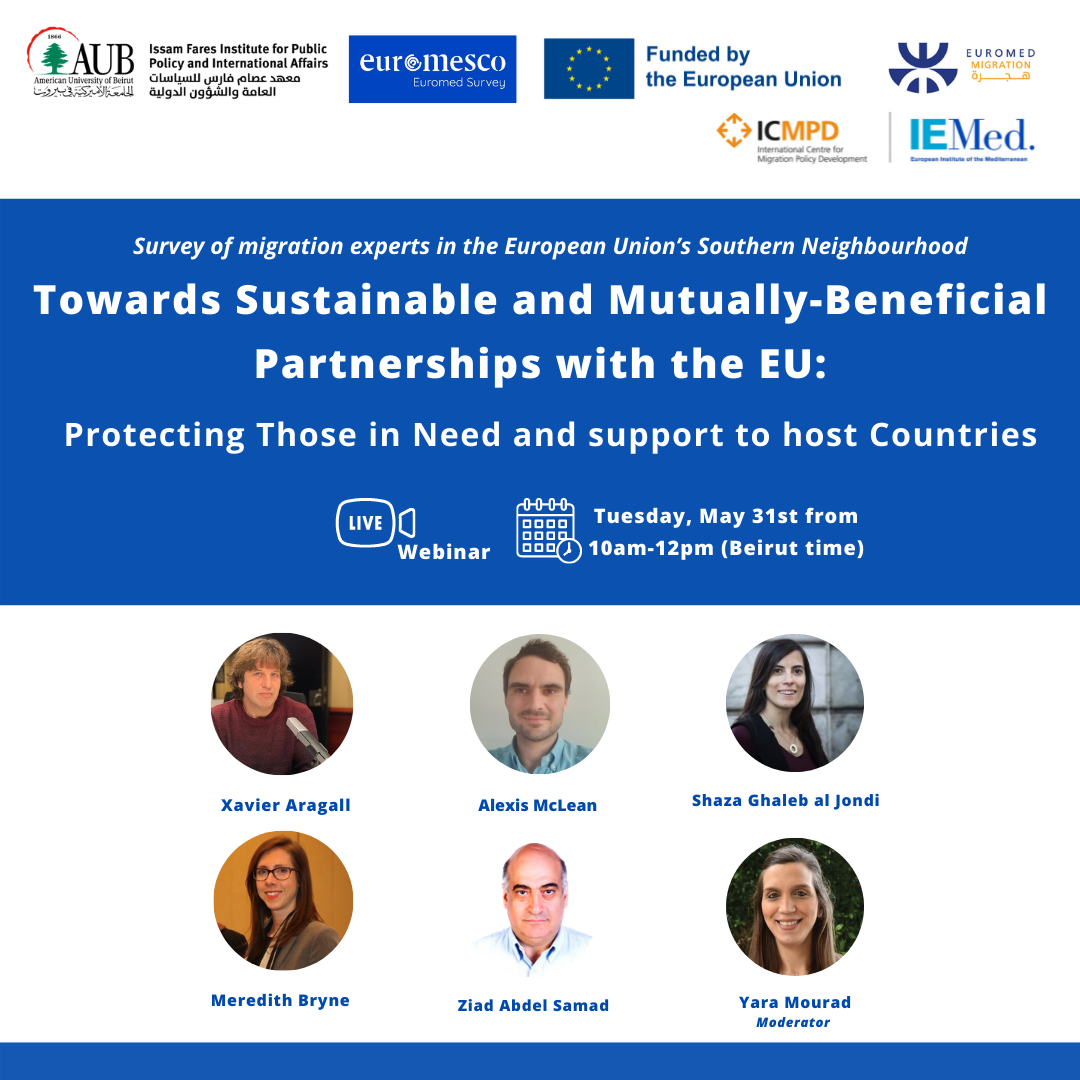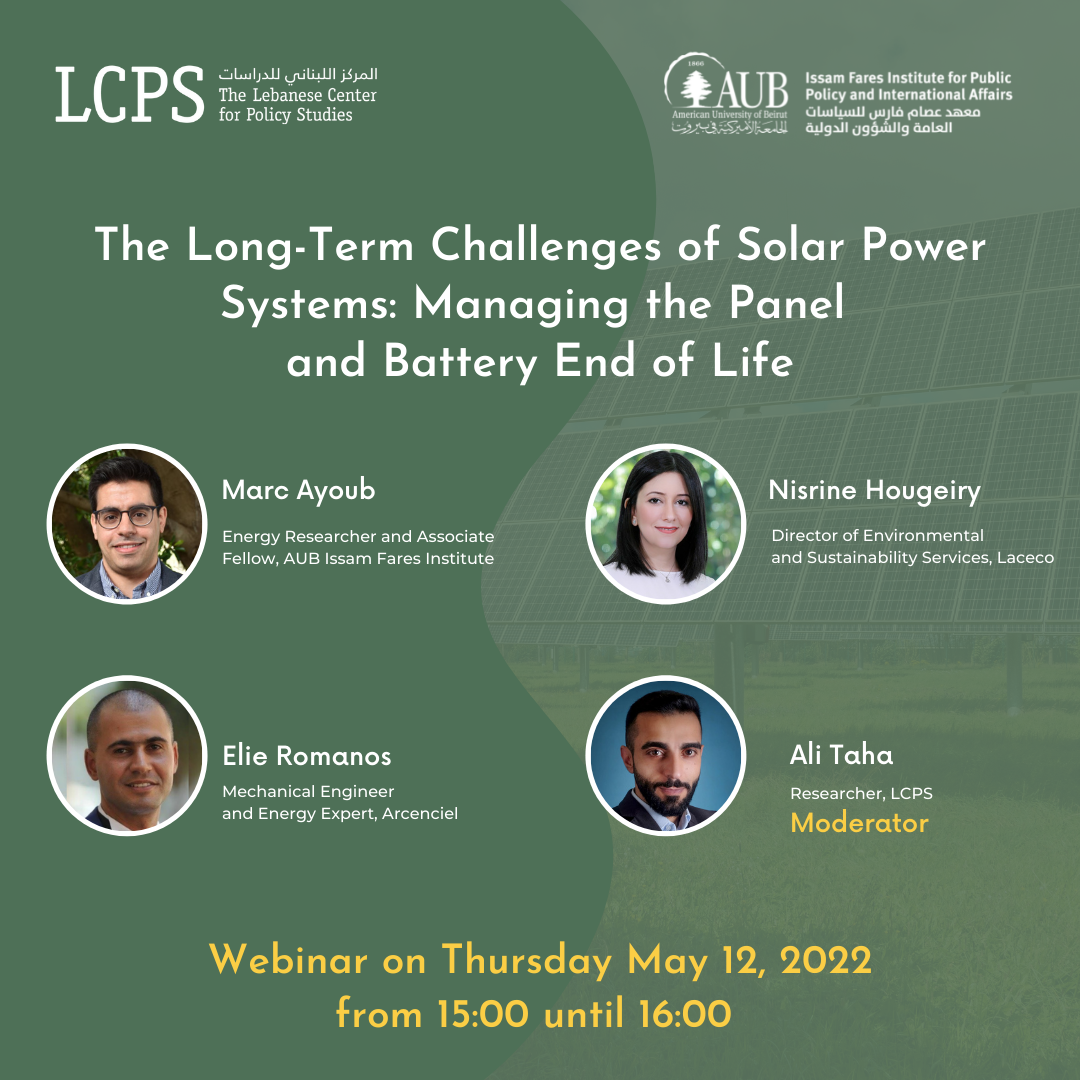|
The AUB Issam Fares Institute for Public Policy and International Affairs (IFI) in collaboration with EuroMeSCo organized a survey dissemination event titled “Towards Sustainable and Mutually-Beneficial Partnerships with the EU: Protecting Those in Need and Support to Host Countries”. This event aims to present the EMM5-EuroMeSCo Euromed Survey Results and discuss an analytical article based on the survey results. This webinar is part of the new collaboration between IFI and EuroMeSCo. It was open to the public via zoom on Tuesday, May 31, 2022. The European Institute of the Mediterranean (IEMed) within the framework of the project “EuroMeSCo Connecting the dots” and the International Centre for Migration Policy Development (ICMPD) within the project “EuroMed Migration 5”, carried out this survey to reflect on migration partnerships between the EU and Southern Mediterranean countries in line with the EU’s Joint Communication on a Renewed Partnership with the Southern Neighborhood and the New Pact on Migration and Asylum. It reflects the priorities and viewpoints of the nine European Neighborhood Instrument Southern Partner Countries (ENI SPCs) thereby charting a path for an evidence-driven approach to partnership negotiations. The survey targeted respondents from Southern Mediterranean Countries, including policymakers, experts, and civil society representatives. The results of the survey contain analytical articles that also echo some specific results of the Survey, in the case of Lebanon there is a particular analysis written by the ILO Regional Office for the Arab States focused on partnerships in the context of forced displacement and support to host countries. The Long-Term Challenges of Solar Power Systems: Managing the Panel and Battery End of Life5/12/2022
The AUB Issam Fares Institute for Public Policy and International Affairs (IFI) and the Lebanese Center for Policy Studies (LCPS) organized a webinar titled "The Long-Term Challenges of Solar Power Systems: Managing the Panel and Battery End of Life." The webinar took place on Thursday, May 12, 2022.
Lebanon’s electricity dilemma is being heavily impacted by the continued deep economic crisis the country is witnessing. The inability of the government to finance power production by securing Electricité du Liban’s (EDL) fuel needs for the existing power plants has led to dramatic rationing in the total power production as energy prices surge at an unprecedented rate. This has caused a remarkable rush towards the installation of increasingly competitive renewable energy sources, most notably solar photovoltaic (PV) and batteries (or solar kits) which are now being widely deployed by households and businesses across Lebanon. Solar power is safe, reliable, efficient, and emission-clean. Yet, despite the relatively long lifetime of solar panels of around 15 years, the efficacy of these panels will degrade over time and will eventually be disposed of which poses a waste risk of alarming proportions. The same goes for the batteries (in both types, lead-acid or Li-ion) that have a much shorter lifespan of around 3-4 years. In fact, these items contain lead (Pb), cadmium (Cd), Lithium (Li), and many other harmful chemicals that can leach into the soil and eventually contaminate drinking water sources. This webinar explored available options for an environmentally sound end-of-life management of PV power systems (panels and batteries). The discussion also explored how such waste management practices could encourage the recycling and repurposing of some of the PV power system's essential components taking into consideration Lebanon’s recycling expertise. Agenda Panelists Marc Ayoub Energy Researcher and Associate Fellow, IFI Types of PV power systems and regulatory framework for end-of-life-management Nisrine Hougeiry Director of Environmental and Sustainability Services, Laceco PV power systems waste Elie Romanos Mechanical Engineer and Energy Expert, Arcenciel End-Of-Life Management: Best practices Moderator Ali Taha Researcher, Lebanese Center for Policy Studies |
Archives
July 2024
|


